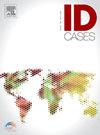Mycoplasma hominis chorioamnionitis associated with preterm delivery: A case report
IF 1.1
Q4 INFECTIOUS DISEASES
引用次数: 0
Abstract
This case report highlights a Mycoplasma hominis infection associated with chorioamnionitis following preterm premature rupture of membranes (PPROM) in a 43-year-old pregnant woman at 30 weeks gestation. The patient presented with a mild fever and increased white cell count, leading to the diagnosis of chorioamnionitis. Empiric antibiotic treatment with ampicillin and gentamicin was initiated, later switched to ceftriaxone. Mycoplasma hominis was identified through routine placental cultures on CDC Anaerobic Blood Agar, and confirmed by whole-genome sequencing (WGS) using the Illumina HiSeq platform. The WGS revealed no resistance mutations to macrolides, quinolones, or tetracyclines, and predicted susceptibility to these antimicrobials. The isolate exhibited a high number of SNP differences (5471–8074) compared to publicly available M. hominis genomes. No specific anti-Mycoplasma treatment was administered, and both mother and newborn had favourable outcomes. This case underscores the importance of considering Mycoplasma infections in pregnancy complications and the need for specialized testing, as routine cultures may fail to detect these organisms. WGS offers a comprehensive approach to pathogen identification and drug resistance profiling, though the clinical impact of targeted antimicrobial therapy for Mycoplasma infections in such cases remains uncertain.
人支原体绒毛膜羊膜炎与早产:1例报告
本病例报告强调了一个43岁的孕妇在妊娠30周的早产胎膜早破(PPROM)后,人支原体感染与绒毛膜羊膜炎相关。患者表现为轻度发热和白细胞计数增高,诊断为绒毛膜羊膜炎。开始用氨苄西林和庆大霉素进行经年性抗生素治疗,后来改用头孢曲松。通过CDC厌氧血琼脂常规胎盘培养鉴定人支原体,并使用Illumina HiSeq平台进行全基因组测序(WGS)确认。WGS显示对大环内酯类、喹诺酮类或四环素类药物没有耐药性突变,并预测了对这些抗菌素的易感性。该分离物与公开的人原分枝杆菌基因组相比,显示出大量的SNP差异(5471-8074)。没有给予特异性抗支原体治疗,母亲和新生儿都有良好的结局。本病例强调了在妊娠并发症中考虑支原体感染的重要性以及进行专门检测的必要性,因为常规培养可能无法检测到这些有机体。WGS为病原体鉴定和耐药性分析提供了一种全面的方法,尽管在此类病例中,支原体感染的靶向抗菌治疗的临床影响仍不确定。
本文章由计算机程序翻译,如有差异,请以英文原文为准。
求助全文
约1分钟内获得全文
求助全文

 求助内容:
求助内容: 应助结果提醒方式:
应助结果提醒方式:


